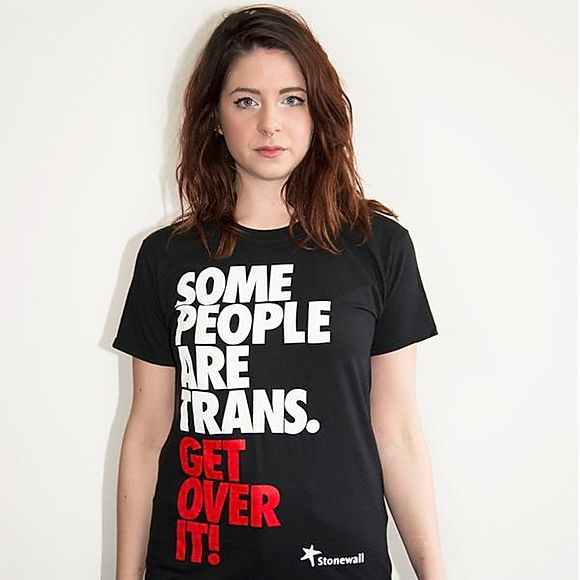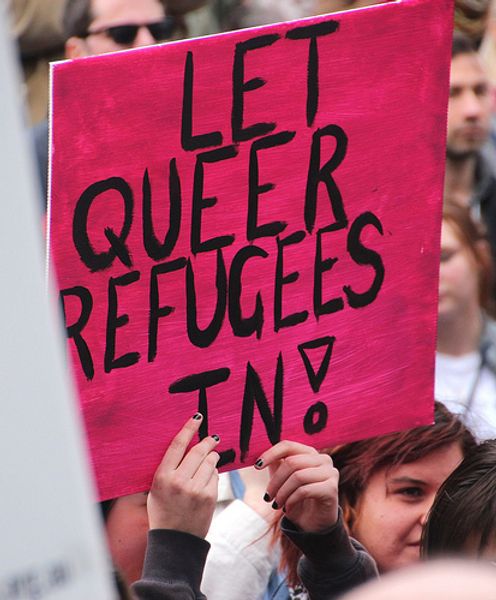President Donald Trump’s order to suspend refugee resettlement – as well as his directive to refuse entry into the U.S. from Iran, Iraq, Libya, Somalia, Sudan, Syria and Yemen — has prompted international outcry and domestic protests, the likes of which haven’t been seen in decades.
Obviously, the anti-Muslim orders are a terrible human rights violation; they are both racist in their profiling and intolerant in their application. However, one group of refugees may be particularly at risk: LGBTI people.
Many of the countries targeted by the Trump administration’s ban have, at best, fraught relationships with LGBTI rights. Several — including Iran, Iraq and Syria — have witnessed terrorist groups and other forces routinely imprison, torture and even kill individuals they suspect of identifying as LGBTI.
While the United States’ refusal to take in refugees from Syria and elsewhere is a massive blow to the broader relief effort, it also significantly narrows the number of safe countries for LGBTI refugees. Many of these individuals cannot stay in countries like Turkey and Greece because there remains a significant risk of persecution.
The Human Rights Campaign’s President Chad Griffin spoke out against Trump’s orders on January 25, stating:
Donald Trump’s unjust and unconscionable executive orders make life more dangerous for countless LGBTQ people, and could equal a death sentence for those trying to escape violence and persecution from places such as Syria. No wall, no matter how high, can block America’s promise of liberty and justice for all.
Griffin went on to note the very real danger this ban could present to LGBTI people fleeing persecution:
The executive order will prevent refugees from escaping some of most violent regimes in the world. HRC’s report, “Helping LGBTQ Refugees and Asylum Seekers in the Age of ISIL,” highlighted how men alleged to have sex with men are hunted down by ISIL, targeted on social media and subjected to extreme violence. Among the vicious attacks: ISIL has tied nooses around these men’s necks and dragged them behind trucks, burned them alive, thrown them off buildings and stoned them to death.

Trans people also face exorbitant levels of violence as a result of deeply ingrained intolerance. Similarly, lesbian and bisexual women have experienced corrective rape, as well as other penalties for their supposed moral infractions.
In an extensive report, Buzzfeed garnered firsthand accounts of what it felt like to hear the news that the U.S. is closing its borders to refugees. A brief excerpt reads:
“I’m going to die here,” said Hamid, a 36-year-old gay man who fled his home in northern Iran in 2014 and was referred to the U.S. for resettlement in August 2016. He is one of many queer Iranians who have camped out in Denizli, a small textile manufacturing city in southwestern Turkey, to endure the years-long wait for a ticket to the West where they hope to build a new life.
It’s important to examine this action with a wider perspective. Many European nations were incredibly slow to react as the mounting crisis in Syria and surrounding nations led to an influx of refugees. When European leaders finally made provisions to help these people, it was often with a begrudging attitude and a focus on minimizing the number of accepted refugees. The UK was one of the worst offenders for its brazen refusal to take in anywhere near its true capacity.
Until the ascent of the Trump administration, the U.S. had been a major contributor to resettlement plans. Recent Pew research found that the U.S. admitted 84,995 refugees in the fiscal year that ended in September 2016. The majority of those resettled in the past fiscal year have been Muslims, with many fleeing the Democratic Republic of Congo and Syria.
Add that to an estimated 31,143 refugees admitted between October 1 and January 24, and the U.S. is currently on course to admit 110,000 refugees in the 2017 fiscal year, a key goal of the Obama administration.
The draft order created by the Trump administration sought a reduction of refugees from 110,000 to 50,000, but there would need to be a dramatic shift for that to happen — perhaps hinting at further orders to come.
Even though Trump’s orders remain dramatically nebulous — and although we don’t yet know what will follow the 120 day limit written into the wider ban — his administration’s use of executive authority to undermine this resettlement plan is not proving popular.

While the American public has traditionally been skeptical of resettling large numbers of refugees, the unilateral action taken by the administration has been widely condemned — particularly because it also alienates nationals with green cards and prevents their travel.
Essentially, due to the anti-Muslim and racist overreach present in these orders, this prejudicial act impacts not just the targeted groups — as terrible as that already is — but also affects legal nationals and business people traveling through the United States.
This blanket profiling, then, is incredibly inhumane, senseless and without any merit. What’s more, for LGBTQI refugees and other refugees from multiple minority groups, it could be deadly.







